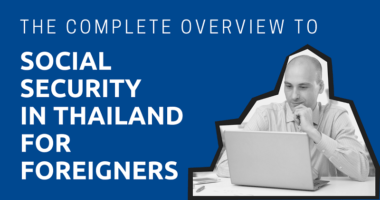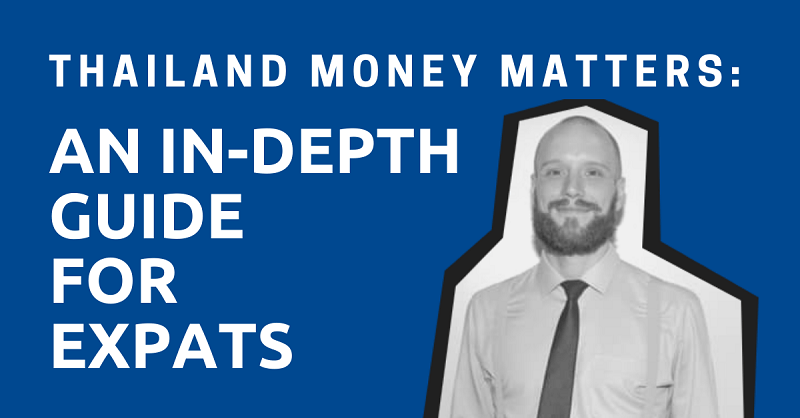
Financial matters in Thailand can have a steep learning curve, as things may not be as straightforward as they were back home.
For example, when you open a bank account in Thailand, you will find that there’s no specific central requirement on what needs to be done. Instead, you will only have a rough idea of the documents you need based on what is listed on the bank’s website. Note that each bank branch has its own specific set of documents required to open an account.
This article is a reference guide for Thailand-based expats who need help navigating the processes involved in exchanging, sending, receiving, saving, and investing money. We also provide links to our other resources to help you further explore specific topics.
Please note that we are not financial advisors or tax professionals, so if you need expert advice for your situation, it’s best to consult a finance professional.
"*" indicates required fields
Disclaimer: This article may include links to products or services offered by ExpatDen’s partners, which give us commissions when you click on them. Although this may influence how they appear in the text, we only recommend solutions that we would use in your situation. Read more in our Advertising Disclosure.
Contents
- Currency Exchange: How to Get the Best Rates for Thai Baht
- Transfers: Sending Money to (and from) Thailand
- Banks: Opening a Thai Bank Account
- Credit Cards: Loyalty Points and Applying as an Expat
- Checks: How to Cash Domestic and International Checks
- Stocks: How to Open a Brokerage Account
- Taxes
Currency Exchange: How to Get the Best Rates for Thai Baht
There are several ways to exchange your local currencies to Thai Baht, with pptions ranging from cash exchange offices to Bitcoin operators.
Normally, the best way to get the best rate for Thai Baht is to bring your local currency and exchange it in Thailand. There are numerous money exchangers available throughout the country. But don’t exchange them at banks, especially at banks’ branches at the airport, because their fees are astronomical.
Instead, visit a money exchanger in the city proper and exchange your money there, so you can get a much better rate.
The most popular money exchangers in Thailand are called SuperRich, and you can find them throughout Bangkok.
You can find out more in our article about how to get the best currency exchange rates in Thailand.
Transfers: Sending Money to (and from) Thailand
Transferring money into Thailand is a whole topic of its own.
While most people think of bank transfers first, in many cases it’s not the cheapest option.
Currently, online money exchange services such as Wise have proven to offer a better way to send money to Thailand compared to other options.
We’ve put together a separate guide to sending money to Thailand to showcase the cheapest and fastest way of doing it.
Transferring money out of Thailand works similarly, so check out the guide above for some more details on that. There is however one thing to be aware of – transfer restrictions when remitting funds from Thailand abroad: Banks usually only permit people to transfer the equivalent of one year’s salary out of the country.
You have to apply for permission to make a transfer abroad and state the reason (e.g. savings, paying for studies abroad, supporting your family), though I’ve never seen anyone ask for proof.
Keep this in mind if you consider bringing large amounts of cash into (and out of) the country. The rules will also differ depending on the bank.
Banks: Opening a Thai Bank Account
Banks in Thailand work tend to operate a bit different from what you’re used to back home. Different branches (even of the same bank) tend to enforce their own approval procedures and document requirements. You might need a long list of documents in order to pick up a credit card at one branch, while another may just hand it over after seeing your Thai driver license.
I remember opening my first bank account in Thailand. A kind, middle-aged bank teller handled the application. My secretary was along to help translate. Halfway through the process, the teller turned to my secretary and asked, “Does he have a girlfriend?”
Maybe I was lucky that I didn’t, because that account setup seemed to go a lot smoother than anticipated; however, not all my dealings with Thai banks went that well.
To help you easily open a bank in Thailand, we’ve put together a guide on opening a bank account in Thailand that’ll help in navigating things when it comes to financial matters. It also covers other banking basics in Thailand including debit cards.
Credit Cards: Loyalty Points and Applying as an Expat
You can get by in Thailand without a credit or a debit card.
You might end up having to pay bills and tickets at the 7/11 or through online banking, but very few things require a credit card. That being said, cards are widely accepted – from supermarkets to restaurants – and using a local card can save you the foreign currency surcharge.
In addition, cash back rewards can even give you on the spot discounts of up to 20%. Since those offers are usually dependent on having a card from a specific local bank, a lot of Thais carry a whole stack of cards with them in order to make sure they have one that qualifies for the best discount.
We wrote a separate article purely focusing on Thai credit cards for foreigners. It covers the whole application process, required documents, best loyalty program, as well as potential alternatives.
Checks: How to Cash Domestic and International Checks
Checks are no longer common in Thailand since online bank transfers are slowly replacing them.
One of the more beneficial uses of checks is to make international transfers: in the past I’ve cashed THB checks into bank accounts in Germany. The advantage of that method is that the German bank converts THB to EUR rather than the Thai bank (as is the case with a wire transfer). This results in a slightly better exchange rate in my experience.
However, it can take several weeks for the checks to clear and unlike a wire transfer, you won’t know which exchange rate it’s going to be.
Foreign currency checks are a different animal. The first time I tried to cash a USD check with Bangkok Bank, they told me that this option is not available for accounts that were opened less than 6 months ago. I ended up cashing it at a Kasikorn Bank branch (‘Rachadaphisek-Huay Khwang‘). Like everywhere else, it still takes six weeks to get a foreign currency check credited, but at least you can do so immediately after opening an account.
One of the big pros of using checks is that the fees can be lower than for SWIFT transfers. In many cases, you can cash a check for as little as THB 300, making it significantly cheaper than wire transfers if you don’t mind the wait.
Stocks: How to Open a Brokerage Account
If you want to invest money in Thailand, there are some good reasons to go with a brokerage account: there is no capital gains tax on profits from buying and selling shares listed on the SET and dividends can be taxed at a flat rate of 10%.
Brokerage fees tend to be very low; Siam Commercial Bank, for example, only charges a transaction fee of 0.25% (with a minimum of THB 100).
You can open a brokerage account without being a resident, but you’ll have to do it in person. In terms of paperwork, it’s one of the most arduous procedures in this article: the ‘standard’ contract by SCB to open an online brokerage account is thirteen pages long.
The user interface is a bit clunky but it gets the job done.
After you open a brokerage account, you can choose to download a mobile application such as Streaming where you can buy Thai stocks.
For a more detailed guide to dealing with brokers and investment in Thailand, check out our guide on how to invest in Thailand as an expat.
Taxes
The current VAT rate in Thailand is 7%. If you work in Thailand, you are subject to Thailand’s personal income tax, which follows a progressive rate structure with a maximum of 35%.
On the other hand, if you bring money to Thailand within the same calendar year after you’ve earned it, you are also required to pay income tax in Thailand.
Read our guide to Thailand income tax for foreigners to get more information about this.
It’s worth noting that the Thai government offers several tax incentives for savings and investments, which can be particularly beneficial for those who are working in Thailand.
Two of the most common investments that receive preferential tax treatment are SSFs and RMFs.
At this point, we really want to repeat that I’m not an accountant or a tax professional. If you decide to get serious about investments, please do your own research or contact a professional for advice.
While We’ve done our best to ensure the accuracy (including running it past our own accountant), we can’t guarantee that it’s accurate and you’ll have to use the information at your discretion and without any guarantees. There are some serious tax risks associated with this, so please research things with caution and if in doubt, consult a tax professional.
Super Saving Funds (SSFs)
SSFs are the most popular tax incentivised savings option for the working population of Thailand. In essence, you can put up to 30% (up to a maximum of THB 200,000) of your yearly income into one of these funds and exclude that amount from your income when calculating taxes. The higher your marginal tax rate is, the more interesting this becomes.
There are a number of downsides to this though. You’ll need to keep it invested for at least ten years before you can withdraw it without a penalty. If you withdraw before then, you can face severe tax penalties that consist of the originally owed amount plus 1.5% interest per month (that’s a yearly rate of 19.6%!) since the time you originally would have owed the taxes.
More importantly, the super saving funds that are eligible for tax savings tend to have a slightly higher management fee, which will eat up part of your tax savings.
As a rule of thumb, you can only buy a SSF if the management fee is below 1% and your marginal tax rate in that year is at least 20%. Anything worse than that and the tax savings go to the bank. In addition, you should make sure to sell it after ten years and invest in something with a lower management fee instead.
Retirement Mutual Funds (RMFs)
There are some similarities between RMFs and LTFs: each allows you to invest up to 15% (not more than THB 500,000) of your yearly income while still receiving tax incentives.
The main difference is that with an RMF, you’ll have to keep paying in until you are at least 55 years old in order to keep the tax benefits. That makes it immensely inconvenient, especially for younger expats who might only be in the country for a limited number of years.
In addition to that, the management costs are going to eat up not only your tax savings, but also your gains beyond that. Then there’s also a significant tax risk associated with it, due to the likelihood of making a mistake over the course of its duration.
If you are in the top tax bracket and either certain you’ll stay in Thailand permanently or are older than 45 years old, RMFs get really interesting: the potential tax savings are much more significant and keeping up payments in the future will be less of a hassle and risk.
The Stock Market
One of the biggest Thai tax incentives for private individuals is the lack of a capital gains tax on profits made from buying and selling shares listed on the Stock Exchange of Thailand. This only applies to the difference between the purchasing and selling price.
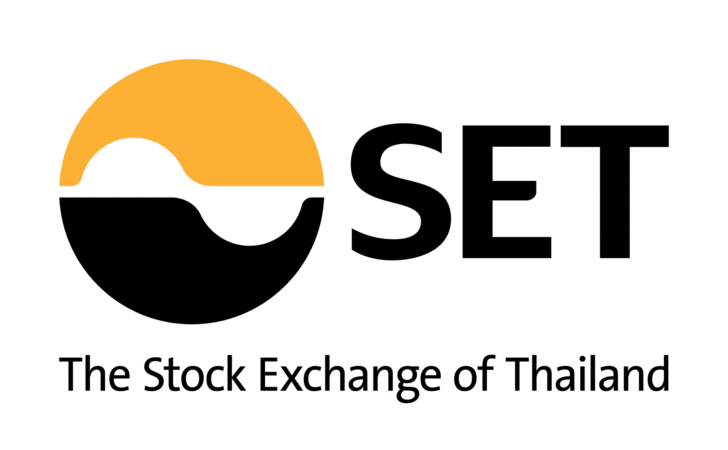
Dividends still get taxed at a rate of 10% or whatever your personal taxation rate is (talk to an accountant about what works out better for you).
As to how to go about opening a trading account, please see the brokerage account section above.
Essential Guides on Thailand Finance
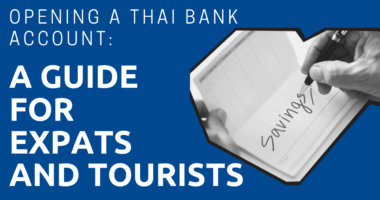 Opening a Thai Bank Account: A Guide for Expats and Tourists 2023-03-22 One of the first and most essential things expats need to figure out in Thailand is how to open a… ... Read more
Opening a Thai Bank Account: A Guide for Expats and Tourists 2023-03-22 One of the first and most essential things expats need to figure out in Thailand is how to open a… ... Read more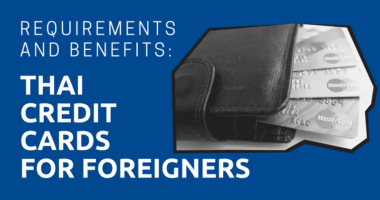 Thai Credit Cards for Foreigners: Requirements and Benefits 2024-02-09 Getting a Thai credit card can be challenging for Thais let alone expats. This is because banks hold us to… ... Read more
Thai Credit Cards for Foreigners: Requirements and Benefits 2024-02-09 Getting a Thai credit card can be challenging for Thais let alone expats. This is because banks hold us to… ... Read more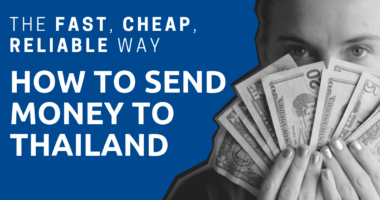 How to Send Money to Thailand: The Fast, Cheap, Reliable Way 2024-03-01 Get the most baht for your buck by using these money transfer services. ... Read more
How to Send Money to Thailand: The Fast, Cheap, Reliable Way 2024-03-01 Get the most baht for your buck by using these money transfer services. ... Read more Health Insurance in Thailand: What You Need to Know as an Expat in 2024 2023-11-20 As an expat in Thailand, you might be wondering why you should obtain health insurance here. While the cost of… ... Read more
Health Insurance in Thailand: What You Need to Know as an Expat in 2024 2023-11-20 As an expat in Thailand, you might be wondering why you should obtain health insurance here. While the cost of… ... Read more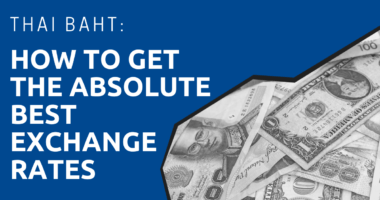 Thai Baht: How to Get the Absolute Best Exchange Rates 2024-02-17 Where to go to change your cash into more Thai Baht -- and where not to go.. ... Read more
Thai Baht: How to Get the Absolute Best Exchange Rates 2024-02-17 Where to go to change your cash into more Thai Baht -- and where not to go.. ... Read more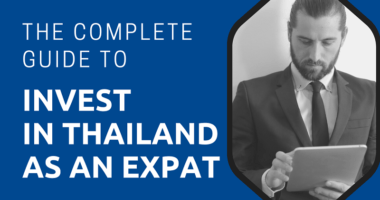 The Complete Guide to Invest in Thailand as an Expat 2023-02-09 Thailand is one of the largest economies in Southeast Asia. And its modern infrastructure – including airports, seaports, well-connected roads,… ... Read more
The Complete Guide to Invest in Thailand as an Expat 2023-02-09 Thailand is one of the largest economies in Southeast Asia. And its modern infrastructure – including airports, seaports, well-connected roads,… ... Read more
Latest Guides on Thailand Finance
-
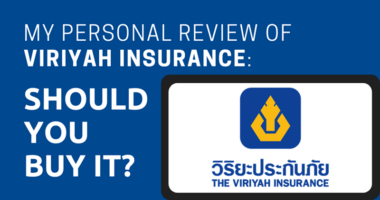 My Personal Review of Viriyah Insurance: Should You Buy It? 2024-04-17 When looking for car insurance in Thailand, Viriyah Insurance is going to be one of the very first companies that…
My Personal Review of Viriyah Insurance: Should You Buy It? 2024-04-17 When looking for car insurance in Thailand, Viriyah Insurance is going to be one of the very first companies that… -
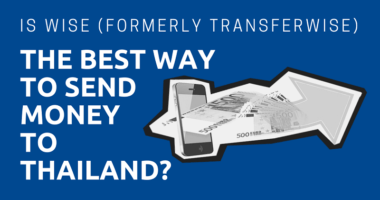 Is Wise the Best Way to Send Money to Thailand? 2024-03-10 Get the most Thai Baht for your buck using Wise on your next international transfer.
Is Wise the Best Way to Send Money to Thailand? 2024-03-10 Get the most Thai Baht for your buck using Wise on your next international transfer. -
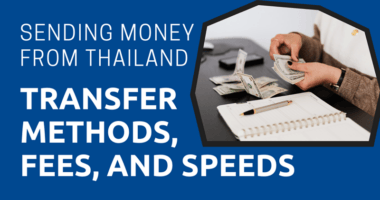 Sending Money from Thailand: Transfer Methods, Fees, and Speeds 2024-03-10 Find out how to transfer money out of Thailand using these three methods.
Sending Money from Thailand: Transfer Methods, Fees, and Speeds 2024-03-10 Find out how to transfer money out of Thailand using these three methods. -
 How to Send Money to Thailand: The Fast, Cheap, Reliable Way 2024-03-01 Get the most baht for your buck by using these money transfer services.
How to Send Money to Thailand: The Fast, Cheap, Reliable Way 2024-03-01 Get the most baht for your buck by using these money transfer services. -
 Thai Baht: How to Get the Absolute Best Exchange Rates 2024-02-17 Where to go to change your cash into more Thai Baht -- and where not to go..
Thai Baht: How to Get the Absolute Best Exchange Rates 2024-02-17 Where to go to change your cash into more Thai Baht -- and where not to go.. -
 Thai Credit Cards for Foreigners: Requirements and Benefits 2024-02-11 Getting a Thai credit card can be challenging for Thais let alone expats. This is because banks hold us to…
Thai Credit Cards for Foreigners: Requirements and Benefits 2024-02-11 Getting a Thai credit card can be challenging for Thais let alone expats. This is because banks hold us to… -
 A Guide to Thailand’s Mandatory Health Insurance Rules for Retirees (2024) 2024-02-06 If you want to retire in Thailand with the right visa, you must have health insurance. Compulsory health insurance is…
A Guide to Thailand’s Mandatory Health Insurance Rules for Retirees (2024) 2024-02-06 If you want to retire in Thailand with the right visa, you must have health insurance. Compulsory health insurance is… -
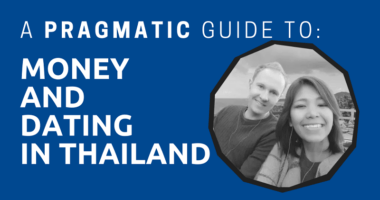 A Pragmatic Guide to Money and Dating in Thailand 2024-01-25 It’s always tricky navigating money and relationships in Thailand. There are so many expats who are afraid to get into…
A Pragmatic Guide to Money and Dating in Thailand 2024-01-25 It’s always tricky navigating money and relationships in Thailand. There are so many expats who are afraid to get into… -
 Car Insurance in Thailand: A Complete Buying Guide (2024) 2024-02-01 Road accidents happen regularly in the Land of Smiles. Thankfully, there are various choices of car insurance in Thailand from…
Car Insurance in Thailand: A Complete Buying Guide (2024) 2024-02-01 Road accidents happen regularly in the Land of Smiles. Thankfully, there are various choices of car insurance in Thailand from… -
 Insurance Brokers in Thailand: A List of Recommended Companies 2024-01-16 When it comes to buying insurance, you would want to get the right plan for your needs. It is a…
Insurance Brokers in Thailand: A List of Recommended Companies 2024-01-16 When it comes to buying insurance, you would want to get the right plan for your needs. It is a… -
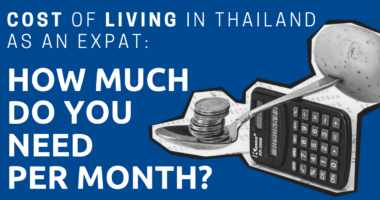 Cost of Living in Thailand as an Expat: How Much Do You Need Per Month? (2024) 2024-01-28 A detailed look at how much things cost in the country, and what kind of lifestyle you can live with…
Cost of Living in Thailand as an Expat: How Much Do You Need Per Month? (2024) 2024-01-28 A detailed look at how much things cost in the country, and what kind of lifestyle you can live with… -
 Health Insurance in Thailand: What You Need to Know as an Expat in 2024 2024-02-06 As an expat in Thailand, you might be wondering why you should obtain health insurance here. While the cost of…
Health Insurance in Thailand: What You Need to Know as an Expat in 2024 2024-02-06 As an expat in Thailand, you might be wondering why you should obtain health insurance here. While the cost of… -
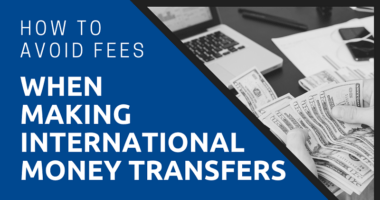 How to Avoid Fees When Making International Money Transfers 2023-10-04 International money transfers are becoming more important every day. So, it’s important to find a method that will save you…
How to Avoid Fees When Making International Money Transfers 2023-10-04 International money transfers are becoming more important every day. So, it’s important to find a method that will save you… -
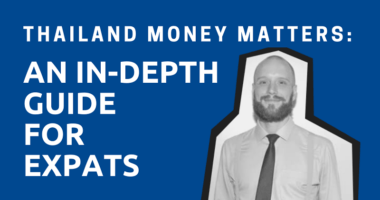 Thailand Money Matters: An In-Depth Guide for Expats 2023-11-20 Financial matters in Thailand can have a steep learning curve, as things may not be as straightforward as they were…
Thailand Money Matters: An In-Depth Guide for Expats 2023-11-20 Financial matters in Thailand can have a steep learning curve, as things may not be as straightforward as they were… -
 How to Avoid Paying VAT When Buying a Used Car 2023-08-29 One of the main reasons used cars are so expensive in Thailand is because the Value Added Tax, or VAT.…
How to Avoid Paying VAT When Buying a Used Car 2023-08-29 One of the main reasons used cars are so expensive in Thailand is because the Value Added Tax, or VAT.… -
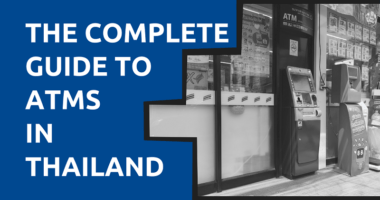 The Complete Guide to ATMs in Thailand 2024-02-13 Using the machines to get cash with your foreign or Thai ATM couldn't be easier.
The Complete Guide to ATMs in Thailand 2024-02-13 Using the machines to get cash with your foreign or Thai ATM couldn't be easier. -
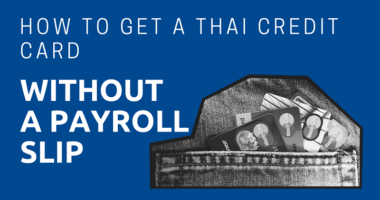 How to Get a Thai Credit Card without a Payroll Slip 2023-06-29 Unless you have a high-paying job in Thailand with at least an 80,000 baht salary, it can be difficult to…
How to Get a Thai Credit Card without a Payroll Slip 2023-06-29 Unless you have a high-paying job in Thailand with at least an 80,000 baht salary, it can be difficult to… -
 A Guide to Online Grocery Shopping in Bangkok 2023-09-20 Tired of eating noodle soup for breakfast, lunch and dinner? Unwilling to shell out THB 490 for a spinach pizza at…
A Guide to Online Grocery Shopping in Bangkok 2023-09-20 Tired of eating noodle soup for breakfast, lunch and dinner? Unwilling to shell out THB 490 for a spinach pizza at… -
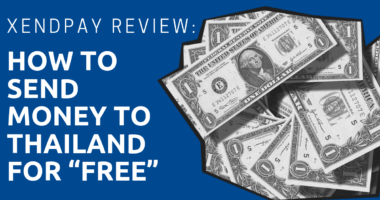 XendPay Review: How to Send Money to Thailand for “Free” 2023-09-20 Are you thinking about sending money to Thailand as a one-time or recurring transfer? Then you’re probably looking for a…
XendPay Review: How to Send Money to Thailand for “Free” 2023-09-20 Are you thinking about sending money to Thailand as a one-time or recurring transfer? Then you’re probably looking for a… -
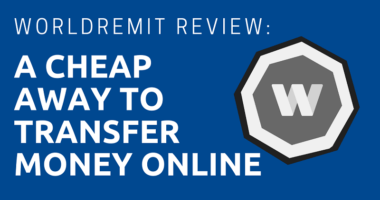 WorldRemit Review: A Cheap Way to Transfer Money Online 2023-09-20 Expats who frequently send money know that in most cases, you have to spend money to send money. If you’ve…
WorldRemit Review: A Cheap Way to Transfer Money Online 2023-09-20 Expats who frequently send money know that in most cases, you have to spend money to send money. If you’ve… - Getting Deals and Discounts on Your Daily Life 2023-06-30 This is one of the 100+ exclusive pieces of content created for our Premium subscribers. To read and unlock all…
- How to Successfully Open a Bank a Account in Thailand 2023-08-28 If you want to open a bank account in Thailand, there are some strict regulations in place. This section breaks…
-
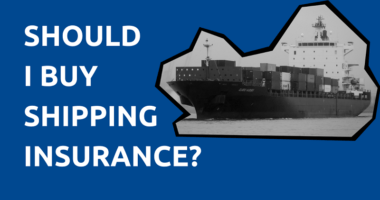 How to Get the Most from Your Shipping Insurance 2023-08-29 Buying shipping insurance is totally optional. Normally, the shipping company will have a contact with different insurance providers and can…
How to Get the Most from Your Shipping Insurance 2023-08-29 Buying shipping insurance is totally optional. Normally, the shipping company will have a contact with different insurance providers and can… -
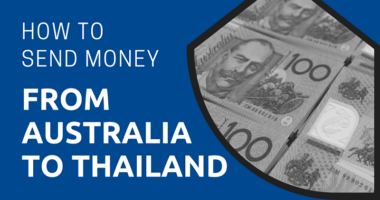 How to Send Money from Australia to Thailand 2023-06-23 If you are living in or planning to move to Thailand, learning how to transfer money from Australia safely, securely,…
How to Send Money from Australia to Thailand 2023-06-23 If you are living in or planning to move to Thailand, learning how to transfer money from Australia safely, securely,… -
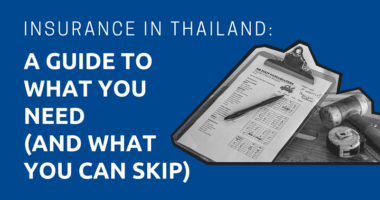 Insurance in Thailand: A Guide to What You Need (and What You Can Skip) 2023-04-13 Wondering which insurance you need and don't need in Thailand? This guide clears up the confusion and tells you which…
Insurance in Thailand: A Guide to What You Need (and What You Can Skip) 2023-04-13 Wondering which insurance you need and don't need in Thailand? This guide clears up the confusion and tells you which… -
 How to Save Over 50% on Your Thai Cell Phone Plan 2024-02-29 This is one of the 100+ exclusive pieces of content created for our Premium subscribers. To read and unlock all…
How to Save Over 50% on Your Thai Cell Phone Plan 2024-02-29 This is one of the 100+ exclusive pieces of content created for our Premium subscribers. To read and unlock all… -
 A List of Popular Insurance Companies in Thailand 2023-06-23 There are many insurance companies in Thailand. According to data from the Office of Insurance Commission (OIC), in Thailand, there…
A List of Popular Insurance Companies in Thailand 2023-06-23 There are many insurance companies in Thailand. According to data from the Office of Insurance Commission (OIC), in Thailand, there… -
 Motorcycle Insurance in Thailand: A Complete Buying Guide 2023-03-31 For a lot of expats, riding a motorbike in Thailand doesn’t seem like a great idea. However, there are benefits…
Motorcycle Insurance in Thailand: A Complete Buying Guide 2023-03-31 For a lot of expats, riding a motorbike in Thailand doesn’t seem like a great idea. However, there are benefits… -
 How to Decrease Your Type 1 Car Insurance Premiums by Over 20% 2023-09-28 Premiums for your Type 1 car insurance can be more expensive than you would expect. Fortunately, there are many things…
How to Decrease Your Type 1 Car Insurance Premiums by Over 20% 2023-09-28 Premiums for your Type 1 car insurance can be more expensive than you would expect. Fortunately, there are many things… -
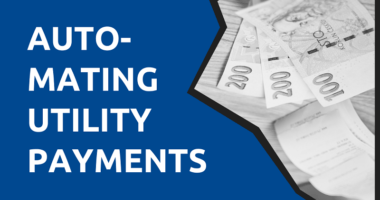 How to Be Hassle Free with Utility Payment by Automating Them All. 2023-08-29 In Thailand, you can automate many payments even without a credit card. Here's how. This is one of the 100+…
How to Be Hassle Free with Utility Payment by Automating Them All. 2023-08-29 In Thailand, you can automate many payments even without a credit card. Here's how. This is one of the 100+… -
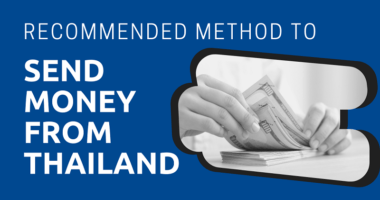 Recommended Method to Send Money from Thailand 2023-08-29 While it’s easy to send money to Thailand, sending money out of Thailand is another story. This is because you…
Recommended Method to Send Money from Thailand 2023-08-29 While it’s easy to send money to Thailand, sending money out of Thailand is another story. This is because you… -
 Saving Money with Credit Cards 2023-08-29 Having a credit card in Thailand isn’t only convenient but it’s also a great way to save money with discounts,…
Saving Money with Credit Cards 2023-08-29 Having a credit card in Thailand isn’t only convenient but it’s also a great way to save money with discounts,… -
 How to Successfully Get a Thai Credit Card 2023-08-29 If you think credit in Thailand works differently than in your home country, think again. Some people come to Thailand…
How to Successfully Get a Thai Credit Card 2023-08-29 If you think credit in Thailand works differently than in your home country, think again. Some people come to Thailand… -
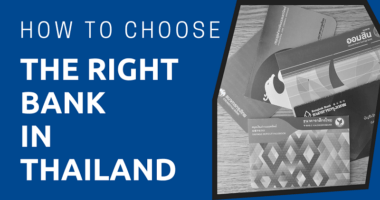 How to Choose the Right Bank in Thailand 2023-08-29 This is one of the 100+ exclusive pieces of content created for our Premium subscribers. To read and unlock all…
How to Choose the Right Bank in Thailand 2023-08-29 This is one of the 100+ exclusive pieces of content created for our Premium subscribers. To read and unlock all… -
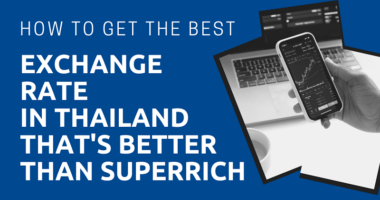 How to Get the Best Exchange Rate in Thailand That’s Better than SuperRich (With Free Delivery, Too) 2023-02-22 If you're looking to exchange money in Thailand, SuperRich isn’t your only option. There's actually another money exchange service that…
How to Get the Best Exchange Rate in Thailand That’s Better than SuperRich (With Free Delivery, Too) 2023-02-22 If you're looking to exchange money in Thailand, SuperRich isn’t your only option. There's actually another money exchange service that… -
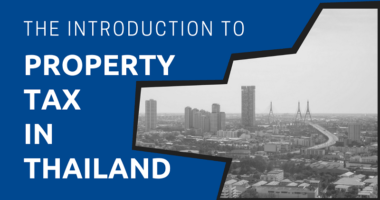 An Introduction to Property Tax in Thailand 2023-06-20 Whether you’re planning to buy a property in Thailand or you already have one, you might be obligated to pay…
An Introduction to Property Tax in Thailand 2023-06-20 Whether you’re planning to buy a property in Thailand or you already have one, you might be obligated to pay… -
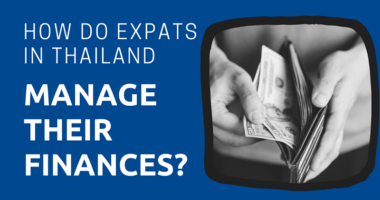 How Do Expats in Thailand Manage Their Finances? 2023-08-29 When living overseas, one popular question among expats is about how to properly manage their finances. You will often hear…
How Do Expats in Thailand Manage Their Finances? 2023-08-29 When living overseas, one popular question among expats is about how to properly manage their finances. You will often hear… -
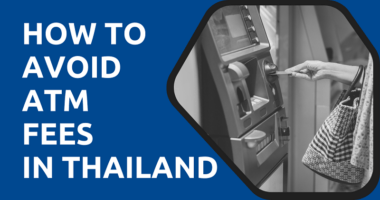 How to Avoid ATM Fees in Thailand 2023-08-29 Thailand has one of the highest ATM fees in the world. Every time you take money from an ATM in…
How to Avoid ATM Fees in Thailand 2023-08-29 Thailand has one of the highest ATM fees in the world. Every time you take money from an ATM in… -
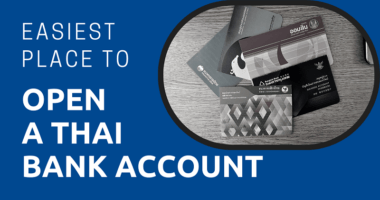 Easiest Place to Open a Thai Bank Account 2023-08-24 You can’t just go to any Thai bank with your tourist visa and open an account. Most of the time…
Easiest Place to Open a Thai Bank Account 2023-08-24 You can’t just go to any Thai bank with your tourist visa and open an account. Most of the time… -
 Best Place to Exchange Money in Thailand 2023-08-29 Normally, you can do it by bringing your cash to Thailand and exchanging it for baht. But there are many…
Best Place to Exchange Money in Thailand 2023-08-29 Normally, you can do it by bringing your cash to Thailand and exchanging it for baht. But there are many… -
 Insider Tips on Choosing the Right Car Insurance Company 2023-09-28 If you have a car in Thailand, another big issue you need to consider is how to choose the right…
Insider Tips on Choosing the Right Car Insurance Company 2023-09-28 If you have a car in Thailand, another big issue you need to consider is how to choose the right… -
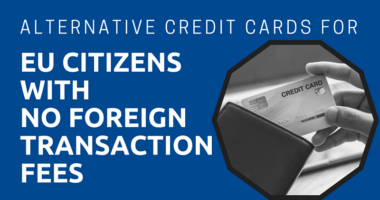 Alternative Credit Cards for with No Foreign Transaction Fees 2023-08-29 t’s a real challenge for expats to get credit cards in Thailand. Even if you’ve been here a long time,…
Alternative Credit Cards for with No Foreign Transaction Fees 2023-08-29 t’s a real challenge for expats to get credit cards in Thailand. Even if you’ve been here a long time,… -
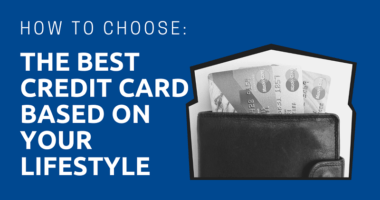 How to Choose the Best Credit Card Based on Your Lifestyle 2023-08-29 A credit card isn’t just convenient. If you know how to use it, you can save money with it as…
How to Choose the Best Credit Card Based on Your Lifestyle 2023-08-29 A credit card isn’t just convenient. If you know how to use it, you can save money with it as… -
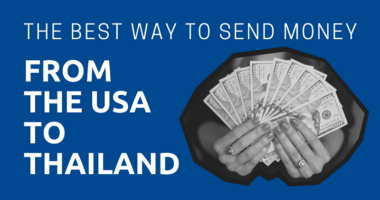 The Best Way to Send Money from the USA to Thailand 2023-06-26 Although there are many ways for you to send money to Thailand, it can be more expensive than you expect…
The Best Way to Send Money from the USA to Thailand 2023-06-26 Although there are many ways for you to send money to Thailand, it can be more expensive than you expect… -
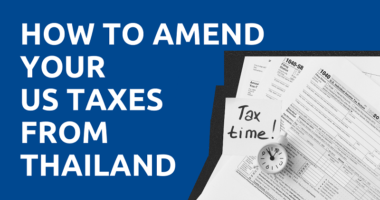 How to Amend Your US Taxes from Thailand 2023-06-26 Research and find an ethical accountant, or may find yourself amending more than once.
How to Amend Your US Taxes from Thailand 2023-06-26 Research and find an ethical accountant, or may find yourself amending more than once. -
 Local Insurance or International Insurance: Which One is Better for Expats in Thailand? 2023-06-26 When it comes to buying health insurance in Thailand, you have two choices – local insurance provided by insurance companies…
Local Insurance or International Insurance: Which One is Better for Expats in Thailand? 2023-06-26 When it comes to buying health insurance in Thailand, you have two choices – local insurance provided by insurance companies… -
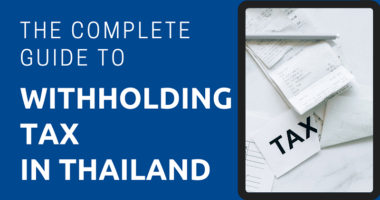 The Complete Guide to Withholding Tax in Thailand 2024-02-14 In Thailand, registered companies are required to file withholding income tax returns for services purchased from individuals or juristic persons.…
The Complete Guide to Withholding Tax in Thailand 2024-02-14 In Thailand, registered companies are required to file withholding income tax returns for services purchased from individuals or juristic persons.… -
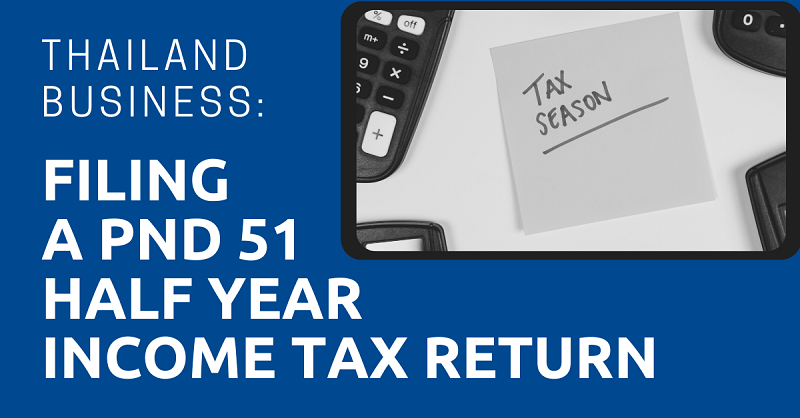 Thailand Business: Filing a PND 51 Half Year Income Tax Return 2022-12-21 The PND 51, also referred to by some as the Half-Year Corporate Income Tax Return, is a tax return form…
Thailand Business: Filing a PND 51 Half Year Income Tax Return 2022-12-21 The PND 51, also referred to by some as the Half-Year Corporate Income Tax Return, is a tax return form… -
 Christmas Dinner in Bangkok: Restaurants, Locations, and Prices 2023-06-30 It was around seven thirty. The staff came out and lined up on the floor. I took a bite of…
Christmas Dinner in Bangkok: Restaurants, Locations, and Prices 2023-06-30 It was around seven thirty. The staff came out and lined up on the floor. I took a bite of… -
 How to Save Over 300% of the Cost of Medication 2023-09-28 Your biggest expense at a hospital can be medication. Private hospitals are known for charging 400% of the original cost…
How to Save Over 300% of the Cost of Medication 2023-09-28 Your biggest expense at a hospital can be medication. Private hospitals are known for charging 400% of the original cost… -
 How to Save 50% on Food and Groceries at Supermarkets 2023-06-26 Although food and grocery prices in Thailand supermarkets aren’t that different, there’s still a way for you to get a…
How to Save 50% on Food and Groceries at Supermarkets 2023-06-26 Although food and grocery prices in Thailand supermarkets aren’t that different, there’s still a way for you to get a… -
 How to Save More than 50% on Your Movie Tickets 2023-06-26 Do you know that you can easily cut movie ticket prices by 50%? You can even get a free movie…
How to Save More than 50% on Your Movie Tickets 2023-06-26 Do you know that you can easily cut movie ticket prices by 50%? You can even get a free movie… -
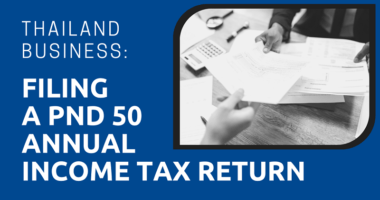 Thailand Business: Filing a PND 50 Annual Income Tax Return 2024-01-25 The PND 50, also referred to by some as the Corporate Income Tax (CIT) 50, is a tax return form…
Thailand Business: Filing a PND 50 Annual Income Tax Return 2024-01-25 The PND 50, also referred to by some as the Corporate Income Tax (CIT) 50, is a tax return form… -
 Four Tips for Getting the Best Price When Buying a New Car 2023-06-26 In Thailand, if you buy a car from a dealership the prices and extras you get for the same car…
Four Tips for Getting the Best Price When Buying a New Car 2023-06-26 In Thailand, if you buy a car from a dealership the prices and extras you get for the same car… -
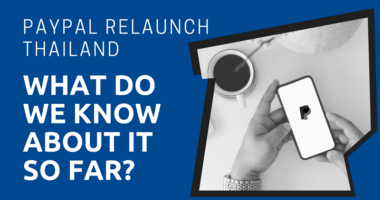 PayPal Relaunch Thailand – What Do We Know About It So Far? 2022-07-18 What to expect when PayPal updates its services in Thailand.
PayPal Relaunch Thailand – What Do We Know About It So Far? 2022-07-18 What to expect when PayPal updates its services in Thailand. -
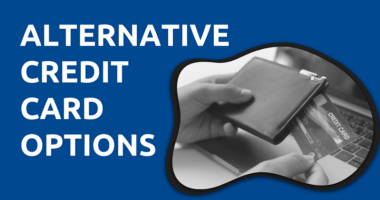 Alternative Credit Card Options 2023-06-28 It can be difficult for an expat to get a Thai credit card. A credit card company usually requires applicants…
Alternative Credit Card Options 2023-06-28 It can be difficult for an expat to get a Thai credit card. A credit card company usually requires applicants… -
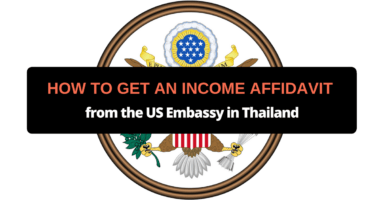 How to Get an Income Affidavit from the US Embassy in Thailand 2022-07-25 Editor’s note: Starting in 2019 the US Embassy will no longer issue income affidavits to anyone applying for Thai visas.…
How to Get an Income Affidavit from the US Embassy in Thailand 2022-07-25 Editor’s note: Starting in 2019 the US Embassy will no longer issue income affidavits to anyone applying for Thai visas.… -
 AMA with Madon Angelica Padilla of Mister Prakan Insurance 2023-09-20 If you missed our latest AMA—or Ask Me Anything—with insurance representative Madon Angelica Padilla, you can find a summary of…
AMA with Madon Angelica Padilla of Mister Prakan Insurance 2023-09-20 If you missed our latest AMA—or Ask Me Anything—with insurance representative Madon Angelica Padilla, you can find a summary of… -
 Bitcoins in Thailand: Mine, Use, and Trade Cryptocurrencies 2022-07-25 The first time I heard of an ATM I was eleven years old. My aunt took me to Seaside Park,…
Bitcoins in Thailand: Mine, Use, and Trade Cryptocurrencies 2022-07-25 The first time I heard of an ATM I was eleven years old. My aunt took me to Seaside Park,…

